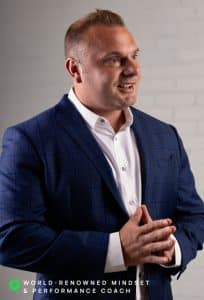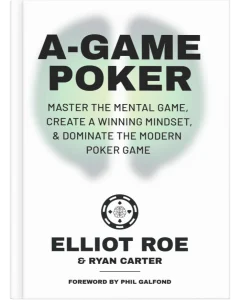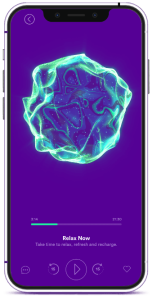Introduction
I recently had the exclusive opportunity to interview Elliot Roe, widely regarded as the world’s #1 mindset and performance coach for poker players, the author of A-Game Poker, and the creator of the Primed Mind app.
Elliot’s track record speaks for itself. He has successfully worked with numerous top poker professionals, including the likes of Phil Galfond, Fedor Holz, Brian Rast, Jason Koon, and many others. His poker clients have collectively won over $100,000,000 and nearly every major tournament title, including the World Series of Poker Main Event.
In this interview, Elliot gives micro stakes and beginning and struggling poker players insights into the philosophy and framework of A-Game poker and how beginner and recreational poker players can greatly benefit from it.
Can you share a bit about yourself and how you got into mindset and performance coaching?
 Thanks, Alton. First off, thanks for having me here; I’m excited to share what I’ve learned over the years with your community. My introduction to the high-performance world was really a series of fortunate coincidences. I tell a story in A-Game Poker about competing in an amateur MMA tournament and how the stress and anxiety that I experienced ultimately sabotaged my chances of winning, even after a strong start.
Thanks, Alton. First off, thanks for having me here; I’m excited to share what I’ve learned over the years with your community. My introduction to the high-performance world was really a series of fortunate coincidences. I tell a story in A-Game Poker about competing in an amateur MMA tournament and how the stress and anxiety that I experienced ultimately sabotaged my chances of winning, even after a strong start.
That planted the seed in my mind, but it wasn’t until years later that I realized there was an opportunity to help others in this area. The big “aha” moment came when I worked with a hypnotherapist to resolve a debilitating fear of flying that I was experiencing. It was so bad that I was unnecessarily missing out on career and social opportunities. I didn’t expect the session to have an impact, but I was willing to try anything at that point.
In the session, we uncovered a memory that I didn’t remember consciously, where my mother told me my Grandfather’s business partner had been killed in a plane crash. We resolved the emotions surrounding this memory, and I walked out of the session able to fly with little to no issues going forward. Even more powerful than resolving the fear was the realization of just how powerful the mind was. If my debilitating fear was resolved so quickly, how else could this approach be used to help people? At this point, I was hooked and promptly enrolled in the best hypnotherapy training I could find.
Eventually, a friend in the industry mentioned that poker players could benefit from mindset work, and the results were significant enough that I was able to grow and scale my coaching to where it is today.
For those unfamiliar with your book and coaching, can you share a bit about the premise and philosophy of A-Game Poker?
 I’ll answer that in two parts because they really deserve their own explanations.
I’ll answer that in two parts because they really deserve their own explanations.
The philosophy of my A-Game Poker system is really about answering something that I call “The Fundamental Performance Question,” which is:
“What are the best in the world doing that I’m not?”
If you’re trying to succeed in any area of life, whether in poker, your career, health, fitness, or even relationships, this is the ideal place to start. The concept of A-Game Poker lays out what my decade-plus of experience working with the best poker players in the world has shown to be effective in succeeding in the game.
My favorite line of the book is:
“Approach poker like a sport, and you’ll have the opportunity to be paid like a professional athlete. Approach poker like a game, and you’ll be lucky to break even.”
Most players, even those who call themselves professionals, approach poker like it’s a game. With the amount of money on the line and the rate at which the technical game advances, that just doesn’t cut it anymore.
If someone came to me and said:
“Elliot, I need to be successful at poker; tell me everything to do, and I’ll do it.”
Now, I can hand them a copy of the book, and they will have a step-by-step blueprint for getting started.
My coaching bridges the gap between what people know they need to do to be successful and actually doing it. I could give you an exact blueprint of what all the best poker players do to reach the top of the game, but it’s only useful if you consistently take action. The short version of why this happens is that we often create subconscious programs that conflict with our conscious goals and desires. I consciously wanted to travel on airplanes, but my subconscious prevented me from doing so because it believed it protected me. With my coaching methodology, we look to discover and resolve the subconscious programs holding you back from taking the actions you need to take to succeed.
You’re also the creator of Primed Mind, a prevalent mindset, visualization, and hypnosis app. Could you share a bit about Primed Mind and how poker players can benefit from it?
 The definition of “Primed” is:
The definition of “Primed” is:
“The state of being ready for use or action.”
Primed Mind consists of hundreds of Primer audios designed to get your mind in the optimal state for whatever you’re trying to accomplish. That might be getting in the zone before a poker session, deep focus before you study, decompressing from a stressful situation, or even falling asleep fast. It’s very similar to using many popular meditation apps but is much more specific with its intentions and outcomes.
It’s a simple tool to boost your performance in the activities that are most important to you. There are audios that can be used as part of your daily routine and ones that are for hyper-specific events that only occur occasionally.
In A-Game Poker, you discuss six levers that determine a poker player’s profitability, where you say efficiency is a significant bottleneck for most players. Can you discuss why that is?
I define the “Efficiency” lever as the gap between the amount of absolute skill you possess and the amount of time you spend applying the full extent of your skills to your decisions. In poker, this is most commonly described as playing your A-Game, B-Game, C-Game, etc. Tilt, anxiety, and self-sabotage are reasons players make poor decisions in-game, even when they know the correct play. In poker, knowing the correct play is worthless. You earn profit by knowing the right play and consistently executing on that knowledge at the tables.
Most players who struggle to earn the profits they desire immediately conclude that more technical study is what they need to improve their situation. However, if there is a large gap between your absolute skill level and your ability to apply that skill while playing, bridging that gap will see you see significantly quicker results.
This isn’t a “mental game vs technical game” debate. In fact, in the book, I describe why I believe that distinction is a false dichotomy. The point is to understand which area of focus gives you the most leverage so you can work towards massive wins rather than marginal improvements.
In your book, you say that A-game poker is about optimizing profits to achieve your personal poker vision. Could you explore that topic a bit?
Great question. This is a critical point in the book.
There are many things you CAN do to improve your poker profits, but you need to evaluate them in the overall context of your vision of the game to see the entire picture. For example, one of my suggestions for serious MTT players is to move to a location where the time zone optimizes their playing schedule. In some places, you start your session in the evening and play until the early morning hours. In others, you start in the morning and play something that fits in the more conventional 9-5 window. The latter will significantly boost your performance, but that doesn’t automatically mean it’s the right decision for everyone. Maybe you love where you live now and aren’t willing to move, even if it means a profit boost.
The point is to be conscious of your overall life’s vision, understand how poker fits in, and evaluate any optimization strategies with this in mind. The point is to make poker a tool for living your best life, not something that puts you in a box you’re constantly trying to fight your way out of.
You’ve developed the A-Game Engine framework, which is composed of preparation, performance, and recovery. Could you give my readers an overview of your framework?
The key to the framework is that an A-Game Player is always in one of the three phases. Each area has a unique purpose that serves the goal of being a successful poker player, and they are divided up so that we optimize the growth that can be accomplished during time spent in that area. Players run into trouble when they combine the areas, intentional or not. For example, many players will say they don’t need to study. They’ll just play and improve their game by doing so. When they try to do both, they end up doing neither very well. When you focus on performing your best on the tables and then reviewing and studying the game later, that ends up leading to the most profit and greatest rate of improvement.
This next example happens to most players but isn’t something they do intentionally. This would be the break between Performance and Recovery. After a session, the optimal approach is to disconnect from the game in order to start recharging your physical and mental batteries. However, most players find it incredibly difficult to set the game aside, constantly ruminating on hands from the previous session. Poker is an incredibly taxing game, and without a dedicated recovery phase, you either end up completely burned out or constantly in a state of sub-optimal performance. This is why, in my book, I have specific routines designed to help you transition between phases so that there is no question which area you are focusing on at the moment.
All the phases are important; however, in my experience, the Recovery phase gets very little attention, which leads to significant long-term roadblocks.
As you know, most of my students are beginning and struggling micro stakes and live low stakes players. How can they value from reading your book and using Primed Mind?
Great question. There is a common misconception that mental game work is only for advanced professional poker players trying to get an extra edge over the competition. That couldn’t be further from the truth, at least with the way I teach it. Earlier, I alluded to the false dichotomy between technical and mental games. Thinking about them as two separate entities doesn’t work when you really dive deep into it. It’s better to think about your overall approach to the game. Are you taking a professional approach or an amateur one?
A beginner or recreational player can take a professional approach just as easily as a full-time player can take an amateur one. It’s more about what you do with the time you devote to the game rather than how much time you have. That means beginners and recreational players will get so much more out of the game if they adopt as much of my A-Game Poker system as possible. In fact, many of my students and readers have told me that the work they’ve done in this area has helped fill the gap between them and players who have the ability to study the game full-time.
The truth is most professionals put little thought or effort into how they approach the game. The sharpest ones do, which is why I’ve had so many clients at the top of the game over the years. That’s why I think my A-Game Poker is a fantastic read for a beginner poker player and a must-read for anyone who is struggling to win. It provides a foundation that can rapidly speed up your progress and allow you to get much more out of your technical study.
Where can my students find your book, app, course, and coaching services?
The best place to start is to head over to https://www.agamepoker.com/ and pick up a copy of the book. It dives deep into everything we discussed today and gives you access to plenty of bonus content, resources, and discounts on my other products.
I appreciate your time today and hope I’ve given your community something to think about.
Add Your Heading Text Here
How useful was this post?
Click on a star to rate it!
Average rating 4.9 / 5. Vote count: 19
No votes so far! Be the first to rate this post.
